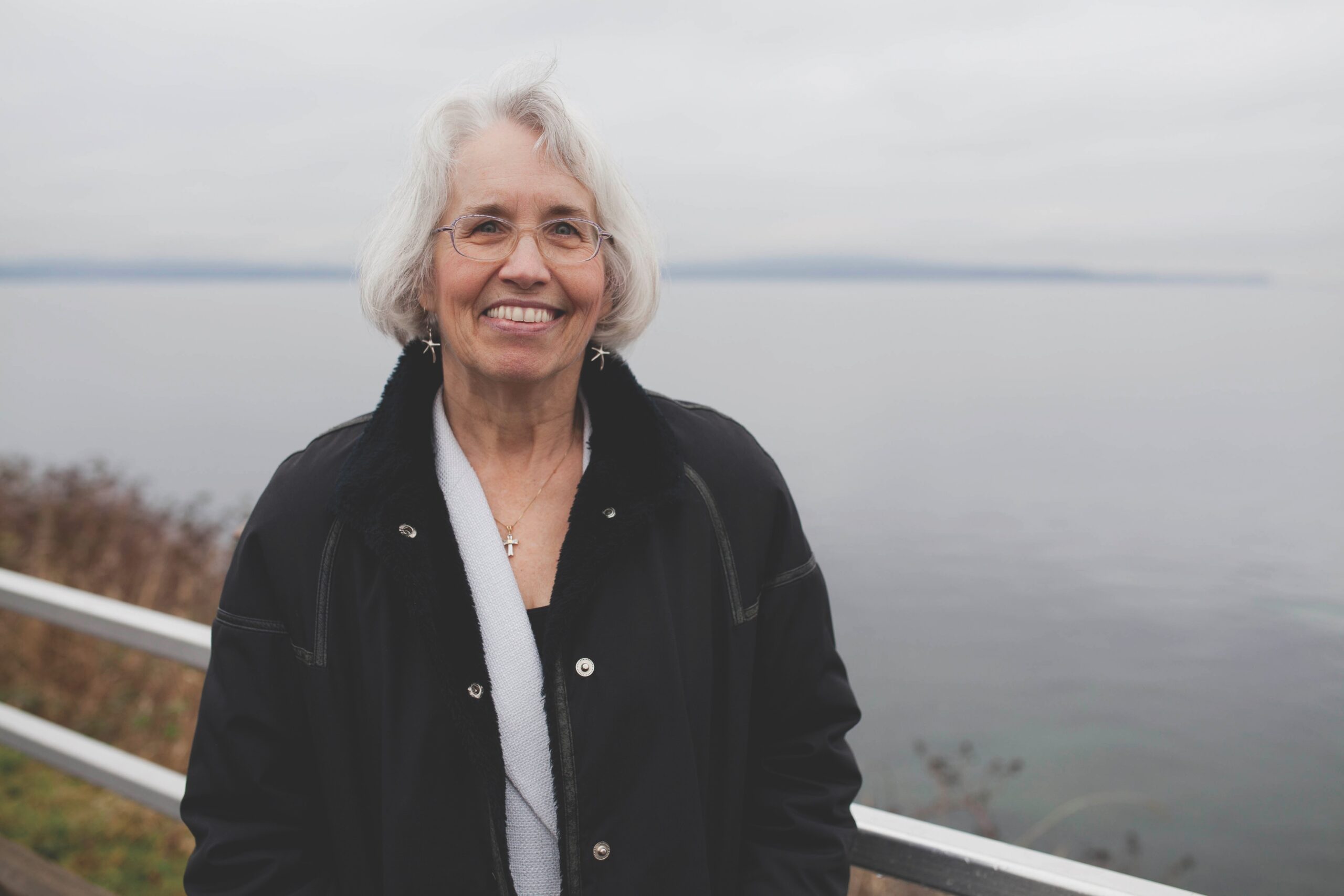As a young midwifery student in the early 1970s, Karen May lived like a Dickens character in a dank Victorian mansion in Dover, England. When not in class at the nearby Buckland Hospital, she hovered with her partner and baby son around the hot coals in the fireplace, surrounded by sheets hung from the ceiling to keep the warmth in.
This was her first experience with coal, so hauling the jet-black buckets and raking the red embers was, if not thrilling, certainly exotic. Growing up in Vancouver, she’d never encountered the stuff; instead, her family used local sawdust as fuel.
“In England, coal was so portable and available,” she recalls. “It was a cheap, dirty source of energy. It’s why we’re addicted to it and we can’t give it up — even though it’s killing us and killing our atmosphere.”
In 1974, May returned to Canada to deliver babies and eventually practise physiotherapy. She never again breathed the distinctive smoky, industrial odour of burning coal.
But now, four decades later, the black stuff is back at the centre of May’s life. An eerie convergence of money, law and geography means that Texada Island, B.C. — where May is the United Church’s feisty designated lay minister — could play a central role in a massively expanded international trade in thermal coal, stretching from Kentucky to China. Port authorities in Washington and Oregon have blocked increased coal shipping south of the border. So to get the U.S. product to overseas markets, the industry is looking to Canadian ports.
In B.C., the Fraser Surrey Docks, just east of Vancouver, has applied to increase coal storage and shipping over five years. At capacity, the docks could handle four million metric tonnes of coal per year — arriving on 320 trains and leaving for Texada on 640 barges.
To climate-change watchers, the plan is outrageous. Coal-fired plants, which produce about 40 percent of the world’s energy, blast carbon dioxide into the atmosphere. Greenpeace calls coal energy “the biggest source of man-made CO2 emissions” and “the single greatest threat facing our climate.”
A Jesus-inspired voice in an otherwise secular movement, May is fighting against the island’s role in the industry as part of the 80-strong Concerned Citizens of Texada.
But she has to tread carefully. Just 1,000 people live on the island, the largest in the Strait of Georgia, about 100 kilometres northwest of Vancouver. Many residents depend on salaries from the three limestone quarries (which gets ground to make cement) or boast a family history in mining, fishing, whaling or forestry.
May’s own congregation is divided on coal. And volunteer burnout threatens to mute even those who are horrified by the prospect of hundreds of barges of coal sailing up the orca-filled Strait of Georgia each year.
May, in other words, has been called to pioneer a new kind of small-town ministerial activism: one that is sustaining, doesn’t alienate neighbours and is hopefully still effective.
“We’re entering difficult times,” she says, reflecting on the place of ministers in community conflicts like the one in Texada. “I think there’s going to be more call for the prophetic voice, and I think the church has a role. I use my prophetic voice from time to time. I’m careful with how I do that. But if we’re not willing to speak to the truth as we see it unfolding around us, then I don’t think we’re doing our job.”
Sunlight streams through the stained glass windows at Texada Island United. They were a gift, May explains, from Bralorne Community Church, a small mining congregation in B.C.’s interior that folded in 1973. The panes show Jesus walking on water, carrying a lamb and talking with little children. Unsurprisingly, there are no images of Jesus rabble-rousing.
Bralorne’s story, from booming mining centre to busted ghost town, has become all too common in British Columbia. Could Texada be next? That’s the fear that motivates some people to support more coal shipping here, May says. The windows are a poignant reminder of what can happen to a community when industry pulls up and leaves.
Yet for May, the call to action is clear. Coal’s promise of jobs is minimal, and the potential damage is extraordinary. The Concerned Citizens have identified various local dangers, such as coal dust blowing through town and settling into shellfish, and tailings leaching into the community watersheds.
“This is not about being comfortable or safe,” she says. Her friend and protest companion, Terry Hollo, plans to kayak in front of the barges, if it comes to that.
“Jesus was about change — revolutionary change in the society he landed in,” May says. “He was called an iconoclast. He came to inspire us to be a whole lot more courageous in striving for the Kingdom of God.”
At the same time, she acknowledges, that kind of conflict won’t work in small-town Canada. She is praying, she says, that the project gets stopped at the Fraser Surrey Docks, where the coal will be loaded off rail cars and onto shallow-water barges for the trip to Texada’s deep-water port. With half a million people living in Surrey, activists there can mount a stronger resistance.
“People are very scared that if we don’t co-operate with industry, the island will become deserted,” she says. “It’s not like I can say I have the congregation behind me. There are some within the congregation who are concerned [about coal’s impacts]. Others are much more fiscally conservative. They don’t try to stop me, and I tend not to preach directly about particular issues. I tend to be more global in my concerns.”
On an island where friends, neighbours and co-workers may not share philosophies, the Concerned Citizens are starting softly. So far, they’re just calling for a health impact assessment to be completed by the province before the expansion is approved. Will the dust collect in human lungs? Will the tailings poison the community’s watershed? These are important questions. No one can really oppose a health study.
The local public health officer has joined the group in its calls for an assessment, as has the local member of provincial parliament. They’re working with the Vancouver-based Voters Taking Action on Climate Change, a crew of ordinary citizens who have already delayed the shipping project for a year.
But what they’re not doing, at least yet, is overturning tables.
A small mountain of inky black coal sits on the Texada Island waterfront. The quarry, owned by Lafarge, currently ships some U.S. coal; the company has asked for an increase in storage capacity to 800,000 tonnes from the current 150,000.
Topped by tire tracks, the mound isn’t visible from the island’s rolling, densely forested roads. But at the end of a long, private gravel drive leading into Lafarge Canada’s work yard, there it is, finally. Lafarge refused to tour The Observer on the site and also refused an interview.
Coal, in most of this province, is usually invisible. Yet it’s B.C.’s biggest export, with $5.1 billion mined out of the Rocky Mountains in 2012. No B.C. energy comes from coal (compared with over 70 percent in Alberta and around 60 percent in Saskatchewan and Nova Scotia, according to the 2012 Pembina Institute study The High Costs of Cheap Power). In Ontario, the government will finish phasing out coal-powered energy this year and aims to become the first North American jurisdiction to ban it.
Nicholas Simons, the MLA for Powell River-Sunshine Coast, says it’s “extremely unfair” that what should be a national debate — whether Canada should participate in the coal trade on this scale — has been downloaded onto this tiny, isolated community where neighbours come first. “If we had a rigorous assessment and discussion, the community wouldn’t feel it was up to them to argue it out,” he says.
But to May, this process has confirmed her belief that the church is being pushed outside its comfort zone. “The church is trying to reinvent itself, and maybe it’s going to look very, very different,” she says. “I believe church as we’ve known it is done. . . . During the women’s movement in the 1970s, we had consciousness-raising groups all across the country. I think we need consciousness-raising groups to figure out a new way forward.”
Plans to turn a small B.C. island into a coal-shipping hub have divided locals.
As the conflict heats up, designated lay minister Karen May preaches patient activism
***
This story first appeared in The United Church Observer’s March 2014 issue with the title “Burning issue.”















